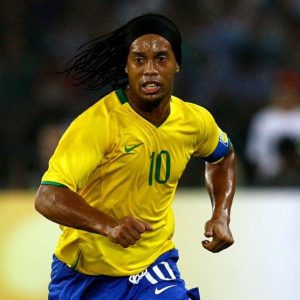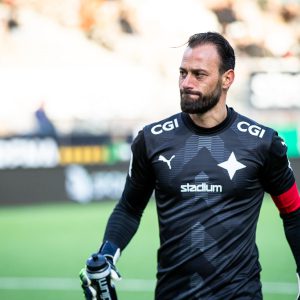

“While you are a professional football player, you have everything on your plate“
Dani Carvalho was the last player using Ajax’s iconic number 14 shirt, which was famously worn by the football legend Johan Cruyff. During his short senior career, the Portuguese international player represented clubs such as Ajax, Atlético Madrid, Benfica, Sporting, and West Ham. The former attacking midfielder tells us about his post-career and experience as a sports commentator in this conversation led by Nuno Milheiro.
Dani hanged up his boots after the 2002-2003 season at Atlético Madrid and did not have a properly defined plan for his post-career.
I do not think you have quite an idea of what you can do after football unless you stop. Two years after I stopped, I decided I wanted to work on television. I had some taste for it. Obviously, I did a lot of interviews and went to a lot of talk shows while I was a football player, but only after spending some time away I decided that I wanted to be linked to football in that way. Then, I have spoken with television channels and started seeking the possibility of showing my skills. After doing it for a couple of weeks they said “okay, we want to make this a regular thing”. It has been eight or nine years already since I am doing that”, he said.
After a long introspective period, the former player stressed the importance of being honest with himself in the process of choosing what to do for the rest of his life. “Now you are going to be for like 30 or 40 years in another profession, so you better decide what is going to fulfill you. While you are a professional football player, you have everything on your plate. Nothing is missing. You just have to ask and you are going to have every situation regarding your personal life resolved. You are used to living like that as a football player”.
When commenting on a game, he tries to put himself in the shoes of the player, the coach, and also the spectator. “I try to see the football player [side], the vision of the coach, what he has prepared for the match, and then I always think about the common spectator. I just try to explain to them what is happening and why sometimes they do this or that, what is right or wrong”.
Sometimes, technical terminology more tailored for coaches or analysts is excessively used on television and not decoded for the majority of football fans.
20 years ago, the message could be transmitted more simply. [Today] I would say that 70% of the people watching the game at home do not understand that kind of terminology. I think that you can find a space in between where everyone can understand what you are talking about”, he explains.
The former Portuguese international player points out that, in comparison with his active period, currently the tactical part is privileged and thoroughly studied, conditioning the spectacularism of technically gifted athletes. “There was more creativity [at his time]. There were a lot of goals and players with a capacity to by themselves bring out spectacular movements. Now I think that football is more tactical, but it is fast. The speed and intensity they put on are amazing. There is not so much space for individual actions. 25 years ago, 6 out of 10 teams had a good number 10, a skillful winger or a midfielder that could make a pass and destroy a team. It is a little bit more difficult for that to happen now but in terms of intensity and dynamics… When teams bring out their best game it is fantastic to see”.
When asked about the goal he would have appreciated to comment on, Dani did not hesitate: the goal he scored at the Amsterdam Arena, against Feyenoord, in the 1997-1998 season. “It was a great game, we won 4-0, but it had a lot of controversy outside the pitch. That would have been a fantastic game for me to commentate”, he concluded.
Categories
Latest Courses
-
9 Lessons
-
1 Lesson
-
6 Lessons
You May Also Like
- Blog
- August 1, 2022
- Blog
- June 3, 2022
- Blog
- May 27, 2022
Developed by Brandit Digital Media Services.





